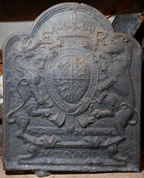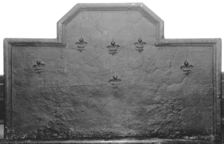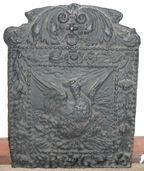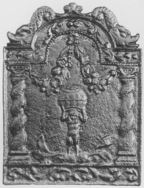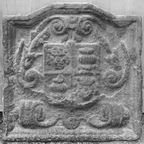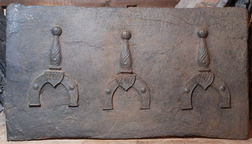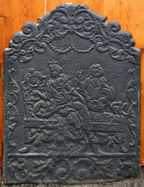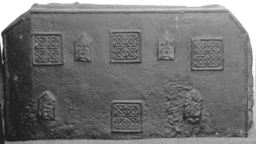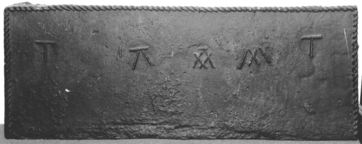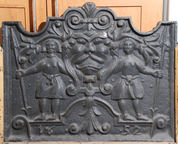-
147
Description: Arched rectangular shape with rounded corners; ovolo within fillet moulding all round; oval Tudor royal shield with garter surrounding, topped with a royal crown; dragon and greyhound supporters; initials split by crown; inscription on a fillet between legs of supporters, behind garter finial; motto on an Ionic plinth at bottom.
Notes: The supporters are those of Henry VII or Henry VIII, but the initials suggest the fireback dates from the reign of Edward VI (1547-53). John Harvo (d. c1565) was a gunfounder who has been identified as occupying Pounsley furnace, Framfield, Sussex, possibly from as early as 1547. This fireback is also seen with a variety of rectangular, rope-edged side panels bearing stamps or letters, some of which link the source of this and other groups of firebacks. The pattern or model for this fireback may have been made during the reign of Henry VIII (1509-47), with the initials added to an early casting using the original pattern. The protuberance on the bottom of the plate may be the remains of the runner from a pouring basin or overflow channel used during casting. Formerly part of the Ade Collection (from Grove Hill, Hellingly, Sussex).
Copies of this fireback are known.
Inscription: E R / HONY SOYT QVE MAL Y PAVNCE / Made in Sussex by John Harvo / DV ET MOVN DRO
Arms: Tudor royal (Edward VI)
- Decoration tags:
- rectangular with round arch (shape)
- fillet and cavetto (edging)
- whole carved pattern
- individual letters
- armorial
- text
Manufactured: in the mid-16th century probably at Pounsley Furnace, Framfield in the Weald area of England.
Current location: Hastings Museum and Art Gallery, John's Place, Bohemia Road, Hastings, East Sussex, England.
Museum number: HASMG: 1952.51.52 (part of the Hastings Museum museum group)
Citation: Butterfield, W. R., 1916, 'Old Wealden Firebacks', The Connoisseur, 46, pp. 197-209.
-
150
Description: Rectangular with pentagonal arch; stepped fillet edging; six fleurs de lys - three in line at base of arch, two near top corners of rectangle, one in middle of rectanngle.
Notes: Other firebacks based on the same shape but with different edging suggests the use of a common base board, but with the edging and other decoration varied to order.
- Decoration tags:
- rectangular with five-facetted arch (shape)
- stepped fillet (edging)
- carved stamps
- heraldic
Manufactured: in the late-16th century in the Weald area of England.
Current location: Hastings Museum and Art Gallery, John's Place, Bohemia Road, Hastings, East Sussex, England.
Museum number: HASMG: 1908.175 (part of the Hastings Museum museum group)
- Attached to series:
- Miscellaneous stamp firebacks
-
154
Description: Rectangular central panel with bead edging; a phoenix, with wings displayed, rising from the flames; rectangular border with bead edging, flowers and leaves festooned from a central flower; initials split either side of a flower at the base; on top, symmetrical swirled leaves.
Notes: Although similar to 'Dutch' types made in north Germany, this is probably an English design. A fireback bearing a phoenix was one of three designs ordered by Trubshaw's, ironmongers of London and Birmingham, from George Sitwell's furnace at Foxbrooke, Derbyshire, in the 1660s. Formerly part of the Ade Collection (from Grove Hill, Hellingly, Sussex).
Copies of this fireback are known.
Inscription: R (or B) G
- Decoration tags:
- 'Dutch' (shape)
- bead (edging)
- whole carved pattern
- individual letters
- mythological
- text
- animals
Manufactured: in the mid- to late-17th century in England.
Current location: Hastings Museum and Art Gallery, John's Place, Bohemia Road, Hastings, East Sussex, England.
Museum number: HASMG: 1952.51.16 (part of the Hastings Museum museum group)
Citation: Lloyd, N., 1925, 'Domestic Ironwork I', Architectural Review, 58, pp. 58-67.
Citation: Riden, P., 1985, George Sitwell's Letterbook, 1662-66 (Derbyshire Record Society vol. 10).
- Attached to series:
- British 'Dutch' style firebacks
- Phoenix firebacks
-
160
Description: Arched rectangular shaped panel with fillet edging; two Salomonic columns supporting a beaded arch; standing figure of Atlas supporting a globe, on ground with plants, and two swags of fruit and leaves suspended from the centre of the arch to the capitals of the columns; above the beaded arch, symmetrical swirls of fruit and foliage; on top, a scallop shell between two sea serpents.
Notes: Probably an English design copying the north German 'Dutch' style.
Copies of this fireback are known.
- Decoration tags:
- 'Dutch' (shape)
- fillet (edging)
- whole carved pattern
- mythological
- architectural
- humans
- plants
- objects
Manufactured: in the late-17th to early-18th century in England.
Current location: Hastings Museum and Art Gallery, John's Place, Bohemia Road, Hastings, East Sussex, England.
Museum number: HASMG: 1917.196.6 (part of the Hastings Museum museum group)
Citation: Butterfield, W. R., 1916, 'Old Wealden Firebacks', The Connoisseur, 46, pp. 197-209.
Citation: Lloyd, N., 1925, 'Domestic Ironwork I', Architectural Review, 58, pp. 58-67.
Citation: Baines, J. M., 1958, Wealden Firebacks (Hastings Museum).
- Attached to series:
- British 'Dutch' style firebacks
-
165
Description: Rectangular with low, 3-facetted arch; ovolo edging; shield of the Goldsmiths’ Company: quarterly Gules and Azure, in the first and fourth quarters a Leopard's Head affrontée Or, in the second and third quarters a Covered Cup between in chief two Buckles fesswise all of the last; behind the shield is a scrolled escutcheon.
Notes: An unusually thick fireback. The Goldsmiths’ Company were granted arms in 1571.
Copies of this fireback are known.
Arms: Worshipful Company of Goldsmiths
- Decoration tags:
- rectangular with three-facetted arch (shape)
- ovolo (edging)
- whole carved pattern
- armorial
Manufactured: in the late-16th to early-17th century possibly in the Weald area of England.
Current location: Hastings Museum and Art Gallery, John's Place, Bohemia Road, Hastings, East Sussex, England.
Museum number: HASMG: 1978.15 (part of the Hastings Museum museum group)
- Attached to series:
- Livery company firebacks
-
166
Description: Rectangular; plain plate with three stamps of an iron firedog with a twisted design on the neck, a primitive face on the terminal and a shield bearing initials RW.
Notes: The letters RW are said to relate to Richard Woodman, ironmaster and Protestant martyr, who resided at Cralle Place, and who operated Cralle furnace. A near-identical firedog was discovered at Bridge Cottage, Uckfield, Sussex.
Inscription: RW
- Decoration tags:
- rectangular (shape)
- none (edging)
- simple stamps
- objects
Manufactured: in the mid-16th century probably at Cralle Furnace, Warbleton in the Weald area of England.
Current location: Hastings Museum and Art Gallery, John's Place, Bohemia Road, Hastings, East Sussex, England.
Museum number: HASMG: 1909.94 (part of the Hastings Museum museum group)
Citation: Butterfield, W. R., 1916, 'Old Wealden Firebacks', The Connoisseur, 46, pp. 197-209.
- Attached to series:
- Firedog stamp firebacks
- Metalware stamp firebacks
-
168
Description: Quasi-arched shape; straight fillet edging to sides and bottom, symmetrical, stepped cavetto, ovolo, cavetto and double arched on top; central pictorial scene of a female and male seated on a couch, both in 18th century dress, with swirled floral border; swirled floral base panel separated by a fillet; two sea serpents on top.
Notes: The dress of the figures portrayed suggests a late-18th century date
- Decoration tags:
- rectangular with ornate arch (shape)
- fillet (edging)
- whole carved pattern
- pictorial
- humans
- objects
Manufactured: in the late-18th century in England.
Current location: Hastings Museum and Art Gallery, John's Place, Bohemia Road, Hastings, East Sussex, England.
Museum number: HASMG: 1910.36 (part of the Hastings Museum museum group)
- Attached to series:
- Miscellaneous pattern firebacks
-
170
Description: Canted rectangle; twisted rope edging (top and sides); square stamp with fillet edge and four diagonally quartered squares, repeated three times along top and once centre bottom; square stamp with triangular top containing intaglio fleur de lys, two positioned between squares in top row, and two separated by square below. Formerly part of the Ade Collection (from Grove Hill, Hellingly, Sussex).
Notes: The smaller stamp could also be interpreted as a face in caricature with a pointed hat, perhaps a bishop's mitre. It appears that more iron was poured into the mould than its depth allowed for, resulting in the considerable thickness of the casting.
- Decoration tags:
- rectangular with canted top corners (shape)
- rope (edging)
- carved stamps
Manufactured: in the mid- to late-16th century possibly in the Weald area of England.
Current location: Hastings Museum and Art Gallery, John's Place, Bohemia Road, Hastings, East Sussex, England.
Museum number: HASMG: 1952.51.22 (part of the Hastings Museum museum group)
- Attached to series:
- Food mould stamp firebacks
- Crossed square Wealden series
-
169
Description: Rectangular; twisted rope edging (top and sides); inscription made of short lengths of twisted rope, irregularly spaced across upper middle, central device formed of a Tudor 'A' with overstamped 'V'.
Notes: It is not clear if the central device is a monogram, or if it might have apotropaic significance.
Inscription: T A M T
- Decoration tags:
- rectangular (shape)
- rope (edging)
- simple stamps
- apotropaic
- text
- objects
Manufactured: in the early- to mid-16th century in the Weald area of England.
Current location: Hastings Museum and Art Gallery, John's Place, Bohemia Road, Hastings, East Sussex, England.
Museum number: HASMG: 1911.60.7 (part of the Hastings Museum museum group)
Citation: Page, S. & Wallace, M. (eds.), 2018, Spellbound (Oxford, Ashmolean Museum), p. 72.
- Attached to series:
- Rope design firebacks
-
171
Description: Quasi-rectangular with raised symmetrical scrolls between semi-circular re-entrants on top edge; ovolo-moulded edge on bottom and sides, with fillet edging on top; grotesque face with swirled hair locks, above an inverted floral spike, between two moustachioed male figures in tunics, holding pikes, standing on a cavetto-moulded compartment, date beneath.
Notes: Alleged to represent the 'Brede Ogre', Sir Goddard Oxenbridge (1478-1531) who, legend states, was sawn in half by local children. Stylistically similar to other firebacks with connections with Brede furnace.
Copies of this fireback are known.
Inscription: 16 52
- Decoration tags:
- rectangular with ornate arch (shape)
- fillet (edging)
- whole carved pattern
- individual numbers
- pictorial
- text
- humans
Manufactured: in 1652 probably at Brede Furnace in the Weald area of England.
Current location: Hastings Museum and Art Gallery, John's Place, Bohemia Road, Hastings, East Sussex, England.
Museum number: HASMG: 1924.42 (part of the Hastings Museum museum group)
Citation: Baines, J. M., 1958, Wealden Firebacks (Hastings Museum).
Citation: Butterfield, W. R., 10 Mar 1934, 'The Brede Ogre', Hastings and St Leonards Observer.
- Attached to series:
- Hooked '1' series
- Brede group
